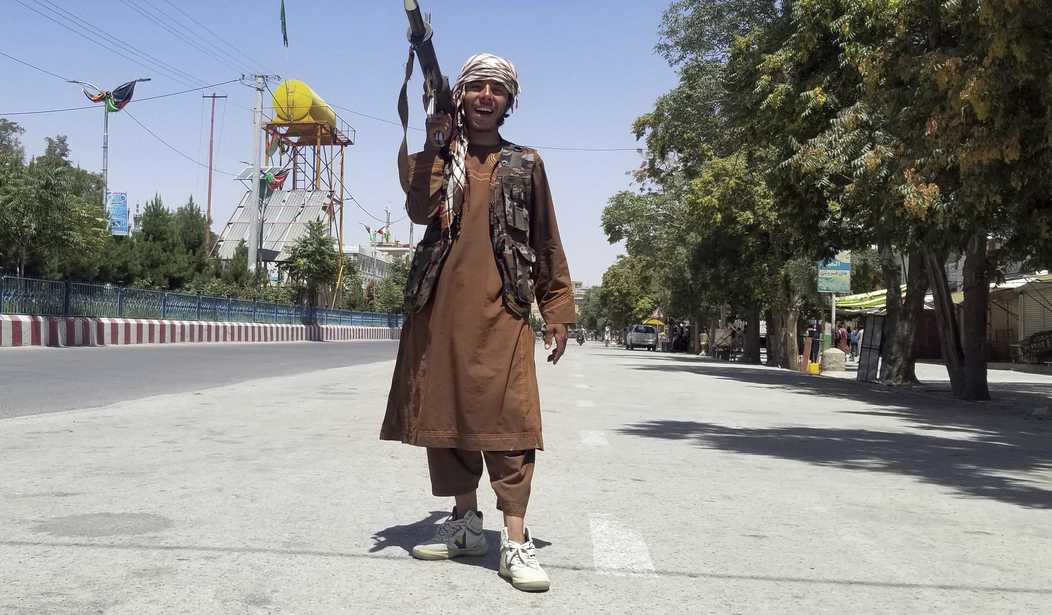The U.S. military has been justly criticized over the last few days for paying more attention to imposing Critical Race Theory and other elements of woke orthodoxy upon our armed forces than to ensuring that those forces could do what they’re supposed to do, which is win wars and defend the United States. Maybe it would have been wise to spend some time formulating an effective way to withdraw our personnel and materiel from Afghanistan safely. But back on June 11, the commander of CENTCOM, Marine Gen. Kenneth F. McKenzie Jr., gave an interview to Military Times, claiming that the military had done just that.
The Military Times interviewer, Howard Altman, asked McKenzie a question that turned out to have far greater significance than it seemed to have at the time: “Have you provided options yet to Defense Secretary Lloyd Austin on securing the embassy in Afghanistan and providing counterterrorism support from outside the country once the withdrawal is complete? If so, can you share what some of those plans and troop levels might look like?”
McKenzie gave the definite impression that such plans were being formulated: “So, I have been in consultation with the secretary, through [Army Gen. Mark Milley, the notoriously woke chairman of the Joint Chiefs of Staff] on providing those plans, and the secretary is still chewing over it. We’re in a back-and-forth process, refining them, so unfortunately right now, because of that, there’s not much more I can share with you about the development of those plans.”
But they were being developed. McKenzie emphasized: “Howard, we have contingencies for everything.” Altman asked him: “Have you presented plans to SECDEF for evacuating interpreters from Afghanistan if so tasked? Can you share those plans, and what is your message for those folks who are waiting?”
McKenzie answered: “So, we have workable plans to evacuate any scale of people that we would be directed to do. That’s one of the things that we have done. I’ve talked to the secretary about it. You know, the actual decision about who’s going to come out, whether they would come out and how that would work, is not the Department of Defense’s decision, that’s a Department of State decision and ultimately a level above the Department of State. I can tell you this. The Department of Defense is prepared to undertake any tasks that we would be required to do in coordination with a presidential decision.”
So unless McKenzie was lying, it was clear: evacuation plans did exist, even if McKenzie was not prepared to discuss their specifics. So what happened to them? McKenzie should be challenged on this, but we would need an independent media for that.
Related: Taliban Find a Way to Win Over the Left: Hunting Down Christians
Altman followed up: “A recent U.N. report warned that the Taliban appeared poised to take back control of Afghanistan for the first time since it was ousted from power by the United States. Do you believe that, why or why not?”
McKenzie wasn’t willing to tackle this question head-on, but he reiterated that the U.S. Embassy would be protected: “So, we’re leaving. That fact is evident to everyone and the only thing that is going to remain, if we can protect it, will be our embassy platform — our diplomats that will be there. And we still intend to support the Afghan military from just over the horizon. We’re still going to support them with funding. We’re going to try very hard to support the Afghan air force over the horizon; some things will come out of the country to be worked on. We will do some televised remote advising with them as we go forward. All those things, we will continue to do that. I don’t want to minimize this, because I think they’re going to be tested, but we will continue to support them, just not in the way we are supporting them now.”
Sure, General. And we see now how carefully those plans were devised and implemented.
With another question, Altman seemed to anticipate the current catastrophe in Afghanistan when he asked McKenzie: “Do you foresee realistic threats to the homeland emanating from Afghanistan after withdrawal is completed and what worries you most about that?”
McKenzie was as definite about this threat as he had been about the formulation of evacuation plans: “We know, with a high degree of certainty, that al-Qaida and ISIS, and the version of ISIS that’s in Afghanistan — ISIS Khorasan is what we call it — they both have aspirations to attack the United States. Long-standing, very public track record of wanting to attack our homeland, and the homelands of our partners as well in Europe and in other places. So, this is well established and well-documented from their own mouths. We believe that what has prevented these attacks from being developed, both from Afghanistan and from Syria as well over the last few years, is the pressure that’s been put on these groups. And so in Syria, for example, we and our SDF partners work very hard to keep that pressure on them so they don’t have — particularly ISIS — the ability to generate those attack plans because they’re busy scrambling around for their own survival. Sort of the same thing occurs in Afghanistan. So, what would concern me the most in the long term would be a future situation in Afghanistan where there wasn’t adequate pressure kept on these groups, because we know left unmolested that they are certainly going to rebuild, restrengthen themselves, and we have no reason to doubt they don’t mean what they say when they say, repeatedly and earnestly over the past few years, that they want to attack us in our homeland.”
That’s true. There is no reason to doubt that they mean what they say, or that they will be plotting jihad massacres in the United States. What there is reason to doubt is McKenzie’s word, given his deceptive answer regarding securing the embassy in Kabul. Would you trust this man to protect the United States from jihad terror attacks? Should anyone trust him?










Join the conversation as a VIP Member